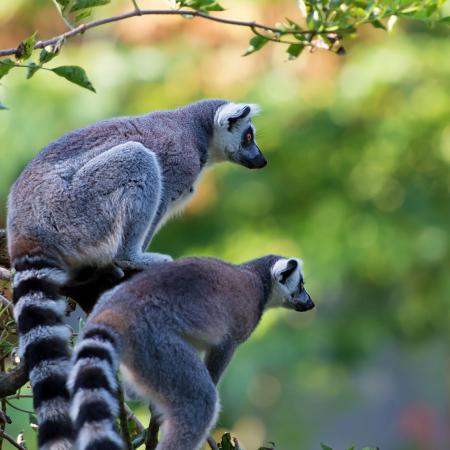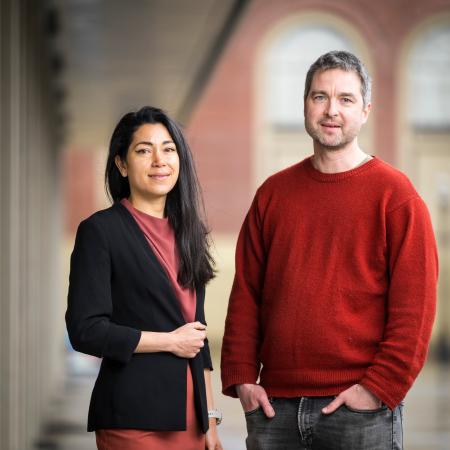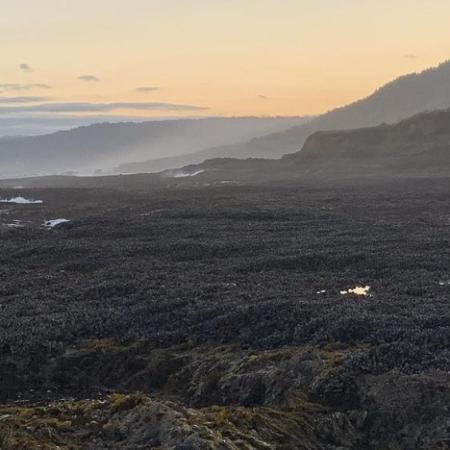Biodiversity research faculty in Integrative Biology are dedicated to conserving our national resources for future generations. From documenting population changes over generations, examining the effects of ocean acidification on marine wildlife and testing solutions for coral reef decline, our researchers have received international recognition for their efforts to understand, protect and preserve wildlife and the ecosystems it depends on.
Our biodiversity faculty

Jamie M. Cornelius
My lab investigates how birds respond to acute and chronic environmental challenges and collaborates with conservation groups to improve conservation plans and approaches.

Benjamin D. Dalziel
I have broad interests in ecological and evolutionary dynamics, particularly related to the health of human and animal populations, and to the maintenance of biodiversity. I am particularly interested in (i) the ecology and evolution of infectious diseases, especially the impact of host population structure on pathogen spread and diversification and (ii) how collective behavior affects trophic interactions and ecosystem stability. To address these questions I work with students and collaborators at the interface of mathematical models and empirical data.

Dee Denver

Dee Denver

Kathryn M. Everson
Members of our lab work on a variety of natural systems to understand how life on Earth evolves. Our research often addresses how species are related to one another (phylogenetics), how their evolutionary history has been shaped by landscape features (phylogeography) or ecology (molecular ecology), and how they are impacted by inter-species hybridization.

Kirsten Grorud-Colvert

Kirsten Grorud-Colvert
My research focuses on marine biodiversity, ecosystem function, ocean conservation and management, marine protected areas, international policy targets, and science-to-policy connections

Sally D. Hacker
I am a coastal ecologist interested in natural and managed ecosystems under varying contexts of species interactions and global change. As a community ecologist, I have conducted research with plants and animals in rocky intertidal, estuarine, and coastal dune ecosystems. I have collaborated with other coastal scientist around the world to understand the ecosystem services of coastal interface habitats and their value to coastal management. There are three major themes that guide my research and that of my students:
• The processes important to community structure and function at local and regional spatial scales in dune, estuary, and rocky intertidal communities
• The mechanisms important to the protective role of ecosystems in mitigating coastal vulnerability from climate change
• The invasion, hybridization, and restoration dynamics of invasive coastal vegetation

Sarah K. Henkel

Sarah K. Henkel
I am a benthic ecologist at the Hatfield Marine Science Center and Associate Director of the Pacific Marine Energy Center at Oregon State University. Her research broadly addresses potential effects of human activities (e.g. marine renewable energy installations, marine reserve designations, coastal development, invasive species, climate change) on seafloor habitats and species.

Jane Lubchenco

Jane Lubchenco

David A. Lytle
Our lab uses evolutionary ecology to understand how organisms and communities are shaped by disturbances such as floods, droughts, and dams. Much of our focus is on aquatic insects, but lab members also work on projects involving fish, frogs, and riparian plants. Current projects examine the evolution of species in regulated rivers, population dynamics and biodiversity estimation in desert streams, management of dammed rivers with prescribed flow regimes, and theory of interaction-neutral community models.

Christopher J. Marshall

Christopher J. Marshall
My research is directly related to documenting biodiversity and to providing access to, and interpretation of, historical biodiversity data in the form of museum specimens. This work, and the data it generates, are critical components for conservation.

Bruce A. Menge

Bruce A. Menge
Major research areas are marine community and meta-ecosystem ecology, physiological ecology, and impacts of climate change, including ocean acidification, on the stability of coastal marine ecosystems.

Su Sponaugle
Our lab uses advanced technology to image plankton in the ocean. Many of the taxa we are now able to "see" in their natural configurations have been previously under-sampled due to limitations of sampling gear. Our efforts quantifying the spatial and temporal distributions of numerous planktonic taxa is shedding critical light on biodiversity in the ocean and enabling us to better understand the marine food web. The food web underlies life in the ocean and a deeper understanding of its functioning is necessary to manage, conserve, and anticipate future changes to ocean life.

Rebecca C. Terry
Research in the Terry Lab applies historical and paleontological approaches to modern conservation issues. Specifically, we place modern populations, species and their communities within a temporal framework in order to better understand how and why they have changed.

Virginia M. Weis
Corals form the foundation of coral reef ecosystems. Our foundational discovery work on the cellular and molecular underpinnings of coral-algal symbiosis informs efforts to develop solutions to coral reef decline. In addition, I am leading efforts to create coral germplasm repositories to preserve coral biodiversity.
Related Stories
Across the Department












